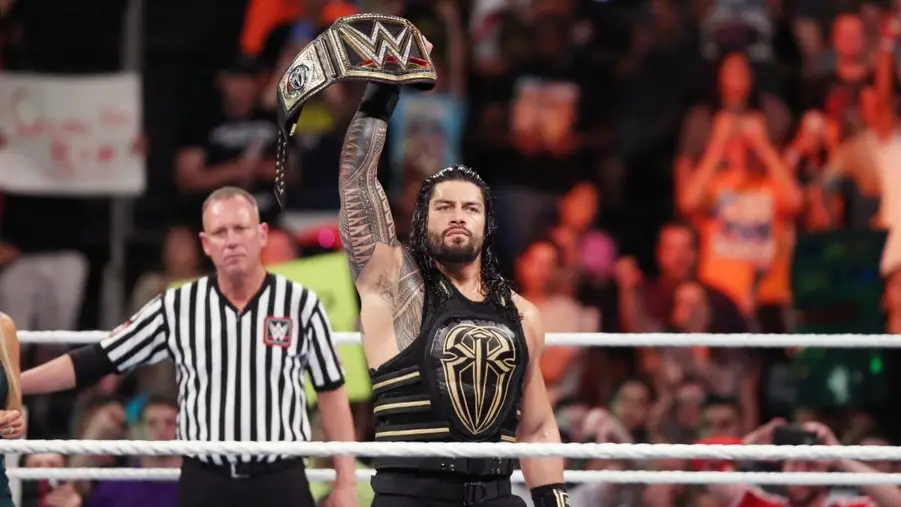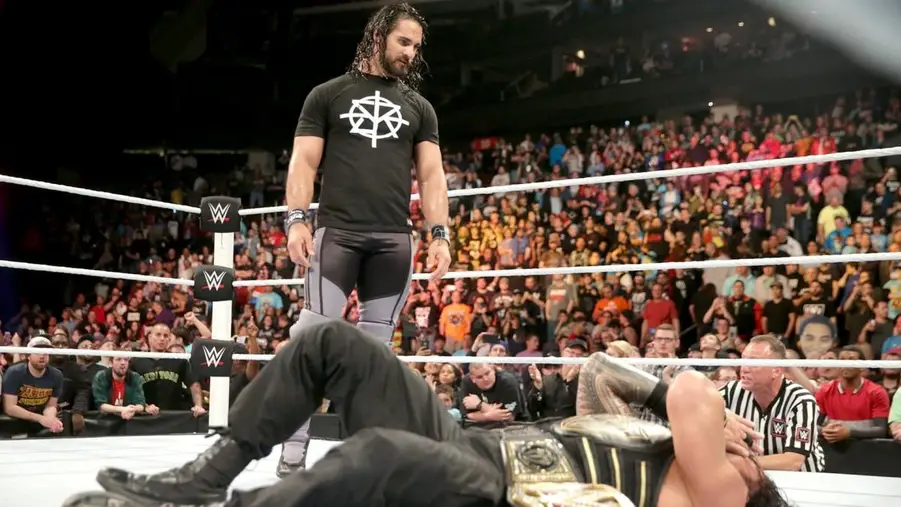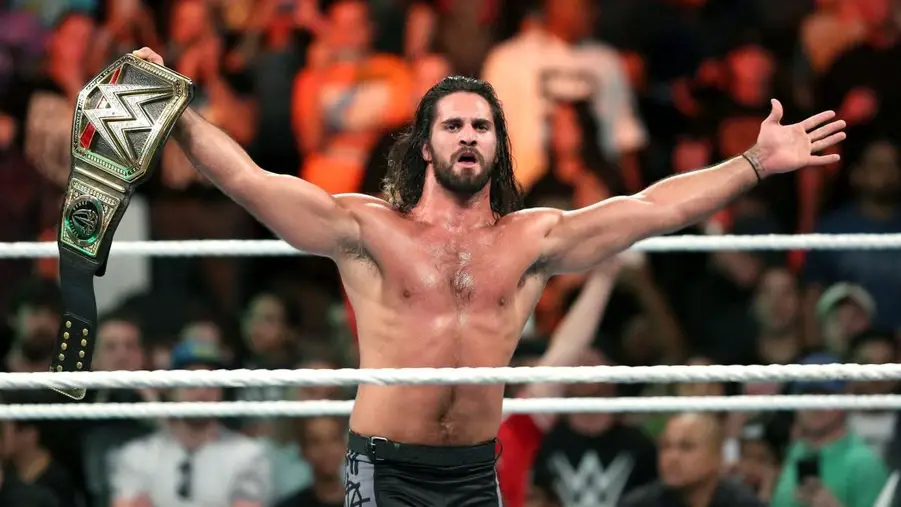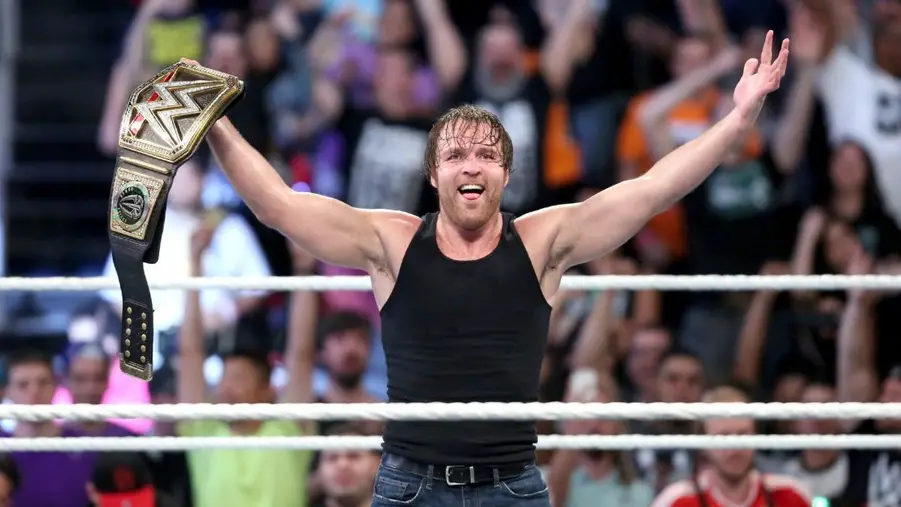A Reflection On The Shield's Supremacy At WWE Money In The Bank 2016
The Shield all shared the WWE championship five years ago, a moment which feels both contemporary-and ancient
What a difference five years can make.
Some food for thought: less time passed between The Shield's WWE 2012 debut and the night all three of its members held the WWE title (three and a half years, thereabouts), than between that night and today.
Where in the hell has time gone?
The publication of this article slightly precedes the five year anniversary of the 2016 Money in the Bank pay-per-view, the night in which Roman Reigns, Seth Rollins, and Dean Ambrose each laid claim to the WWE Championship, all within a few minutes of one another.
It was notably an evening where two Ohio-based ne'er-do-wells emerged as unlikely World champions (the always-falling-short Ambrose, and the NBA's Cleveland Cavaliers). Not sure either Reigns or Rollins qualifies as the Golden State Warriors in the parallel, seeing as neither of them blew a commanding series lead or anything.
But like the Warriors, a defeat for Reigns felt especially heavy. For over a year and a half, WWE had doggedly positioned and pushed Reigns as the successor to the bulletproof hero mantle that an aging, Hollywood-aspiring John Cena was soon to leave behind.
To say that Reigns' ascendance was met with high levels of fan outrage and annoyance is putting it quite mildly.
To re-watch WWE programming throughout 2015 and 2016 is to see a rare level of stubborn insistence, as WWE continued jutting Reigns forth as "the guy", despite vociferously-loud audience dissent.
No matter what Reigns did, no matter who endorsed him through a promo, no matter how many opponents Reigns ploughed through, there remained a glaring lack of connection.
WWE even went so far as to transplant Reigns into a storyline from 15 years earlier. The extended McMahon family banded together against "The Big Dog", as though they were conspiring to hold down Steve Austin or The Rock in a bygone era.
Given Roman's unending push, this felt like the "Way-Too-Much-Latitude" Era.
Reigns laid waste to part-time Triple H at WrestleMania 32 to become WWE champion, not that all of the nostalgic configuring did much for Reigns' fortunes. He still continued to polarize audiences during what was meant to be the reign that solidified him as king of his era.
That's what made the loss to Rollins at the pay-per-view so surprising.
We'd soon find out that Reigns violated the company's Wellness policy, triggering a 30-day suspension. Now it made a little more sense that the all-powerful Roman was pinned clean as a sheet by a sworn heel.
In response to that suspension, much of the anti-Roman brigade came out in full force, crowing all the while. It was practically Christmas morning for anybody that wanted to see the avatar of WWE's "we do what we want because we're the biggest game in town" mindset make such a huge mistake.
Hard to believe that that's the same Roman Reigns that, today, is WWE's most compelling and interesting character.
The "Head of the Table" that boldly dispenses with heartless mind games, chest puffed out as an explicit alpha, is the finest use of Reigns since his time spent as the Shield's brooding clean-up hitter.
It took until 2020 (close to six years after his singles push began) that Reigns became the supreme version of himself.
Fans largely accept (if not outright enjoy) Reigns in this role of physically and psychologically-invincible overlord. Those who clamoured in those interim years for Reigns to turn heel certainly feel justified, as the turn has rejuvenated him in ways that even an ardent fantasy booker couldn't have imagined.
It's quite hard to reconcile this Reigns with the one whose 2016 downfall was mostly met with eager cheers.
Rollins' moment of re-ascent was the beneficiary of those cheers.
Though a heel for the prior two years, Rollins had enough respect and admiration from a large part of the WWE audience to make a face turn a realistic option. As the Shield member possessing the highest level of technique and aerial pizzazz, Rollins certainly had what it took to fill the void left by retired darlings CM Punk and Daniel Bryan, in the eyes of the "Universe".
Perhaps anybody would've earned a massive roar for jumping Reigns at the end of Extreme Rules four weeks earlier, but the fact that it was Rollins (returning from injury, going after the man who held the belt he'd never lost) served to make the crowd especially happy.
After Reigns vs. Rollins was made for Money in the Bank, the most vocal fans largely backed the challenger. This isn't to say that many Rollins supporters were expecting him to win, mind you. After all, they'd just watched Reigns go over on AJ Styles at two straight pay-per-views, and weren't expecting the momentum from the Roman's Super-Reign to die on the vine in less than three months.
Most were probably just looking forward to taking the company to task for jobbing a returning Rollins out, so that -- oh wait, never mind, Rollins just defeated Reigns with a couple of Pedigrees, and without Authority interference.
Cancel those complaints.
It may not have had the panache of storming the ring at WrestleMania 31, hijacking the main event, and winning the WWE title in front of a reported 77,000 fans, but it was a World Title win regardless, for one of WWE's most respected and revered talents.
And like Reigns' eventual reversal of fortune, how weird it is to view this in hindsight.
Rollins' five years since have been interesting, to put it mildly. If the Shield version and the Authority version are the two best versions of "Seth Freakin' Rollins", then whatever's third is clearly a distant third.
There are plenty of options for that lagging bronze medal version, too. Is it the babyface-without-a-reason version that manifested later that year? The Rollins whose defence of WWE in interviews and on social media don't always come off particularly sage? The one that cowers from The Fiend? Or the one with the God complex? Or the one today that makes fascinating sartorial choices?
Honestly, the "Kingslayer"/Shield reunion facilitator is a decent choice for third-best Seth. However, it was worth rattling through the misfires, just to make a point.
While Rollins is pretty much every bit the otherworldly in-ring performer he was five years ago, the regard for the overall presentation for him isn't as sturdy as it was in the preceding era. And a lot of that has to do with some very questionable booking.
Speaking of questionable booking, that brings us to Dean Ambrose.
After winning the magical briefcase a few matches earlier, Ambrose cashed in on a winded Rollins, bowling him over in seconds to capture the only World title he'd ever hold in WWE.
Arguably the most popular member of the group over the past nine years, Ambrose didn't seem to earn the same limitless faith from the WWE office as Reigns did. Whereas Roman was booked to be this unyielding action hero, Ambrose was the quirky weirdo, the eccentric with a death wish existing a notch or two below Reigns on the overall pecking order.
Fans who loved Ambrose latched on to his physical charisma, the sort of dangerous, unpredictable energy that had been evident in his time spent on the indies as Jon Moxley in prior years. In Moxley's promos, you could see the demented genius of a Brian Pillman, the gritty anti-authoritarianism of a Steve Austin, and the innately-honest, try-or-die mindset of a Mick Foley.
On the contrary, Ambrose was the guy that did jobs for exploding televisions, and toted around a potted plant like a sentient friend. Ambrose was a "sort-of-Moxley" that still compelled a large number of fans, while leaving many of them wanting to see his unique talents put to better use.
Indeed, Ambrose didn't reign as champ for too long. After a 12-week reign that yielded a muddled, oddly-conceived face-vs-face match with Dolph Ziggler at SummerSlam, Ambrose lost the belt to AJ Styles at September's Backlash. For his remaining two and a half years with the company, Ambrose remained a tier below headline status, vying for secondary belts when he wasn't receiving on-camera inoculations.
The inoculations were part of the overall last straw that led to Dean Ambrose emerging from the "OUT" door as Jon Moxley once again. In the two years since, he's reigned as AEW World champion, served as the promotional face for the near-unanimity of 2020, and remains one of the promotion's top stars today.
And Moxley does it mostly on his terms, as the performer he wants to be, instead of what a whimsical promoter sees him as.
The Shield's 2012 call-up is a one-night representation of some of the most important main roster debuts of the 2010s. Through smart booking and a successful dynamic, The Shield trio proved they had lasting power, whether together, or as individuals.
And they last to this day, albeit with major alterations in character, and in image.
Maligned Roman, acclaimed Seth, and alternative underdog Dean have since given way to genuine top guy Reigns, consistently-miscast Rollins, and happily-unrestrained Moxley.
Almost nine years later, and five years after the night in which they all successively sat at the WWE apex, the changes in and for each truly demonstrate just how ancient those earlier perceptions of the three feel now.
What a difference five years can make.




